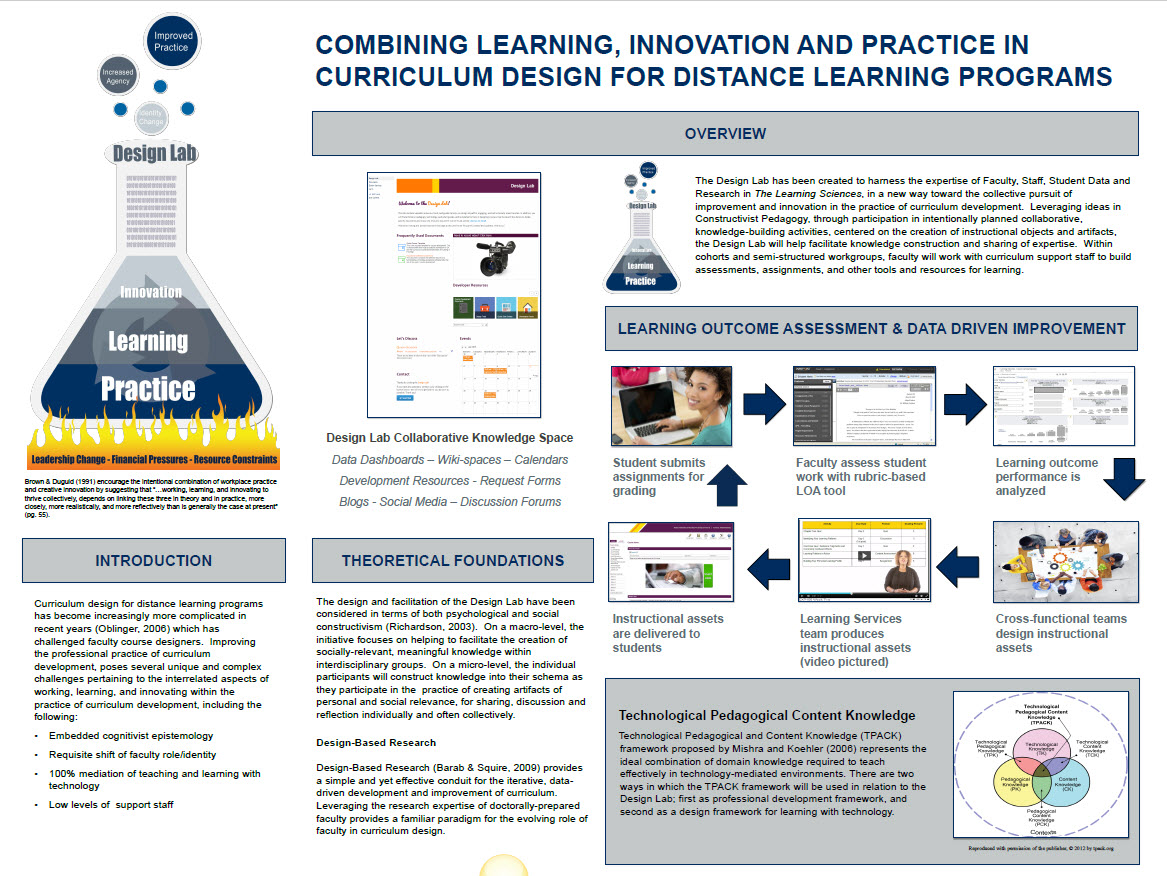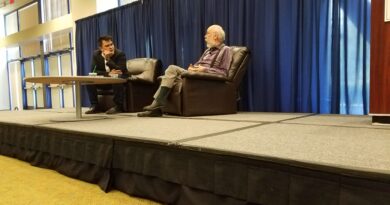Design Lab: Combining Learning, Innovation and Practice in Curriculum Design for Distance Learning Programs
Introduction
Developing distance-learning programs and courses for nontraditional adult students is no simple task and is arguably becoming more and more difficult to accomplish without a team-based, multi-expertise approach. Nearly a decade ago, Oblinger (2006) wrote an article titled, The Myth about Online Course Development in which she argued, “Developing and delivering effective online courses requires pedagogy and technology expertise possessed by few faculty” (pg. 1). The claim challenged the views of many in the academe at the time, and has yet to be universally accepted among many traditional academics.
In the last decade since the article was published, the complexity of designing courses and programs has increased significantly. Increased expectations of institutional effectiveness from regional accreditors regarding Academic Rigor and increasing Retention and Graduation Rates, and more recently Gainful Employment regulations, have all increased the complexity and requirements needing to be considered during the design of distance learning courses and programs. Simultaneously, the complexity of development of curriculum has also increased in terms of risks which must be mitigated. Copyright laws, ADA accessibility requirements, and the diverse world of different devices and browsers with which students access the class and materials, all contribute to the increasing difficulty of developing curriculum without significant support from a team of curriculum support staff with expertise outside of the average faculty member.
Compounding the complexity and adding to the need for additional expertise, all curriculum for online courses and programs at Online University, are centrally developed under the direction of the full-time Faculty, who are also responsible for directing, monitoring and supporting the delivery of the quality of instruction. Each week the Master versions of each of the nearly 700 courses, are copied into the required number of Course sections based on the needs of the nearly 55,000 students. Students are then grouped into individual course sections, along with one of the nearly 400 full-time, or one of over 3000 Associate Faculty who lead the facilitation of learning within the individual sections.
Through this operational model, the content, assignments and assessments within a course are the same for each of the thousands of students who engage in the curriculum regardless of when it is offered, or which faculty member helps promote and measure student learning. With the centralized curriculum model, consistency of the student experience as well as consistency of learning outcome measures are able to be managed, which are critical aspects maintaining ensuring quality at a massive scale. Conversely, the resultant disaggregation of curriculum design from its facilitation adds additional complexity to the already difficult task of designing and delivering asynchronous, technology-mediated learning experiences, in an accelerated format.
Also impacting the complexity and importance of development and delivery of quality curriculum are the level of support required to effectively support the Online University student population. Students at OU are matriculated through an open-enrollment policy, admitting all qualified applicants who are able to provide documentation of high school completion in the form of a Diploma or GED certificate.
While this open enrollment policy provides access to a college education for those who otherwise may not have been able to attend, the broad range of skills and experience that OU students bring to the classroom is both an educational challenge and an opportunity that must be considered in the design of centralized academic curriculum. Demographically, students at OU largely fit the age, employment and residential status criteria of Nontraditional Students (Horn, 1996). OU students, like many of their counterparts in adult-focused institutions often balance multiple sets of responsibilities both inside and outside of the home, are likely to be employed in some capacity, and a large portion of which, have families to support as well. As a result of these traits and others, OU students require a level of support and resource allocation, not often provided at more traditional institutions of teaching and learning.
With the design and implementation of the OU Design Lab, we seek an elegant solution to a set of complex challenges including resource and staffing deficits, a complicated hierarchical structure combined with a distributed workforce, and a population of learners who require a clear and effective curriculum to support their learning. The Design Lab initiative has been designed to harness the expertise of the faculty, staff, available data and research in The Learning Sciences, in a new way; toward the collective pursuit of improvement and innovation in the practice of curriculum development.
Through a combination of collaborative and supported design sessions, technology-mediated communication, knowledge and community building, in conjunction with leveraging a variety of asynchronous web tools the Design Lab will serve to support student learning and success through improved curriculum design practice. Though constructed from an aggregation of both tangible and symbolically mediating tools and signs, (Vygotsky, 1978) the Design Lab is much more than could possibly be described in terms of its physical components alone. The following proposal for the OU Design Lab is presented both in terms of the foundational learning theory and underlying epistemology in contrast to current practices, followed by an analysis of the planned implementation and delivery, evaluated through the requisite sociocultural lens.




